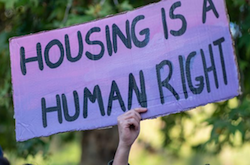The housing market is broken. And those who rely on rental properties are often at the sharp end, as MARY HULL discovered when her son was forced to find a new home. It’s a dispiriting tale of unscrupulous landlords, powerless tenants and squalid, overpriced flats.
My son was close to tears on the phone. They had just come back from yet another viewing – about to be evicted in two weeks from their shared house in Nottingham, time was running out to find a room to rent.
 This time it was a one-bedroomed flat in a run-down part of the city – just about affordable as it was advertised as “all bills inclusive”. Matt had trailed round with nine other people. The flat was a mess, the front door lock smashed in and, just as they were leaving, they noticed an electricity meter. It had been advertised incorrectly; bills were not included so it was not even within their means.
This time it was a one-bedroomed flat in a run-down part of the city – just about affordable as it was advertised as “all bills inclusive”. Matt had trailed round with nine other people. The flat was a mess, the front door lock smashed in and, just as they were leaving, they noticed an electricity meter. It had been advertised incorrectly; bills were not included so it was not even within their means.
I had known for a long time that the rental market was broken. Certainly, much has been written about it recently, but I naively assumed the problem was mostly in places like London and Manchester. Nottingham, I thought, still had access to a good supply of affordable rental properties. How wrong I was.
Matt is self-employed and, working in the arts, their income was devastated by the Covid-19 pandemic, one of many issues that contributed to their predicament. Not only was it incredibly difficult to find an affordable room, proving that they could afford to pay was virtually impossible.
A large proportion of the rental sector is managed by agents who operate a complex system of application forms, guarantor schemes, and non-returnable “holding fees” paid just for the privilege of not losing the property while you fill-in all the forms. If you are rejected you don’t get it back. Time after time Matt was rejected at the application stage as his accounts showed a drop in income during Covid.
Matt used a website called Spare Room. Long established, it used to be a useful place to find rental properties. Often agents weren’t involved, and it was a friendly process of messaging people who had advertised a room. This time Matt would message 15 to 20 people and get maybe three replies, mostly negative.
Meanwhile, a friend who had placed an advert on the site put it into some sort of context. Within 30 seconds of an advert going up he had numerous responses, and within 24 hours he had more than 200 messages. Demand massively outstrips supply, an issue that has grown and grown since council houses were sold off under the Tories but has now reached completely untenable levels.
Bidding wars
In some areas, bidding wars take place for rental properties. Moreover, landlords are increasingly evicting tenants so they can put the rent up, something that has happened recently to two friends in Northumberland. It makes it all the more iniquitous that Liz Truss is threatening to reverse proposed legislation banning no-fault evictions.
 In her excellent article on the private rental sector, Vicky Spratt summarises the causes of this crisis eloquently. She describes the perfect storm of a cost-of-living crisis and a housing crisis on a “collision course”. Rents have soared, supply outstrips demand, and many landlords are passing on their rising costs to tenants.
In her excellent article on the private rental sector, Vicky Spratt summarises the causes of this crisis eloquently. She describes the perfect storm of a cost-of-living crisis and a housing crisis on a “collision course”. Rents have soared, supply outstrips demand, and many landlords are passing on their rising costs to tenants.
On top of this, there is now little protection for tenants. The Scottish government has proposed legislation to improve this but there has been no response from Truss. As Spratt says: “The rental market in England is, to use a technical term, totally and utterly bonkers right now.”
It is no surprise that people at the bottom suffer most. Housing benefit has not risen in line with inflation. People on benefits are in no position to enter bidding wars and challenging poor housing conditions is tricky if eviction is a very real threat. All too often it is also the people with least money who rely on pre-payment energy meters, meaning they have little room for manoeuvre in managing their bills.
Students across the UK have also been at the sharp end as accommodation is often only available far afield or in totally inadequate makeshift dormitories. This echoes the issues with costly and inadequate student accommodation raised on this website in 2020 by Cian Ireland and Daniel Deery.
Labour’s charter
Matt eventually found a room in a house shared with six others, bills included (although the contract small print gave the landlord the right to ask for an increase). They paid a £150 holding fee only for their application to be rejected. I was rejected too, as a guarantor.
The upshot? Between us we paid 12 months’ rent in advance. The room is damp, and Matt has to have a dehumidifier on all night. They have made a complaint but, of course, does not have a leg to stand on. Despite this, we are acutely aware of our privileged position in being able to pay the rent up front. Matt’s flat-mate back at his old place, a young dad split from his partner with growing debts, had still not found a place with just a week to go.
The Labour Party has vowed to introduce a ‘Renters’ Charter’ within 100 days of being elected. This can’t happen soon enough and many would argue it does not go far enough.
Meanwhile, the campaigns for change must be loud and clear. The right to decent, warm, affordable accommodation is a fundamental human right. Those responsible for neglecting this issue should hang their heads in shame.
—-
See also: ‘Student Housing: A Stirling Campaign’ by Daniel Deery and Cian Ireland.
The ILP’s pamphlet Unbalanced Britain: Housing in Crisis, by Quintin Bradley, Simon Jose, Ellen Robottom and Barry Winter, was published in 2016.
Tenants: The People on the Frontline of Britain’s Housing Emergency, by Vicky Spratt, is published by Profile Books and available here.
Generation Rent by Chloe Timperley is published by Canbury Press and available here.


